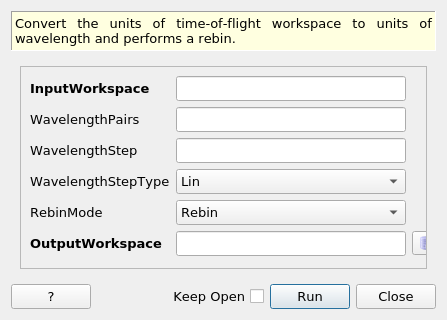\(\renewcommand\AA{\unicode{x212B}}\)
SANSConvertToWavelengthAndRebin v1¶

SANSConvertToWavelengthAndRebin dialog.¶
Summary¶
Convert the units of time-of-flight workspace to units of wavelength and performs a rebin.
Properties¶
Name |
Direction |
Type |
Default |
Description |
|---|---|---|---|---|
InputWorkspace |
Input |
Mandatory |
The workspace which is to be converted to wavelength |
|
WavelengthPairs |
Input |
string |
A JSON encoded list of wavelength ranges. E.g. [[1., 2.], [2., 3.]] |
|
WavelengthStep |
Input |
number |
Optional |
The step size of the wavelength binning. |
WavelengthStepType |
Input |
string |
Lin |
The step type for rebinning. Allowed values: [‘Log’, ‘Lin’] |
RebinMode |
Input |
string |
Rebin |
The method which is to be applied to the rebinning. Allowed values: [‘Rebin’, ‘InterpolatingRebin’] |
OutputWorkspace |
Output |
WorkspaceGroup |
Mandatory |
A grouped workspace containing the output workspaces in the same order as the input pairs. |
Description¶
This algorithm converts the input workspace and a JSON list of wavelength tuples into n workspaces with wavelength units. Subsequently it rebins the wavelength-valued workspace. Either Rebin v1 or InterpolatingRebin v1 is used for rebinning. This algorithm is geared towards SANS workspaces.
Usage¶
Note
To run these usage examples please first download the usage data, and add these to your path. In Mantid this is done using Manage User Directories.
Example - Convert sample workspace to wavelength and rebin:
ws = CreateSampleWorkspace(NumBanks=1, BankPixelWidth=1)
wavelength = (1, 4) # 1-4λ
# import json
# json_string = json.dumps([wavelength]) # this can be used for wavelength pairs too
converted_ws_group = SANSConvertToWavelengthAndRebin(InputWorkspace=ws, WavelengthPairs="[[1, 4]]",
WavelengthStep="1", WavelengthStepType="Lin",
RebinMode="Rebin")
first_workspace = converted_ws_group.getItem(0)
print("There should be 4 values and got {}.".format(len(first_workspace.dataX(0))))
Output:
There should be 4 values and got 4.
Categories: AlgorithmIndex | SANS\Wavelength
